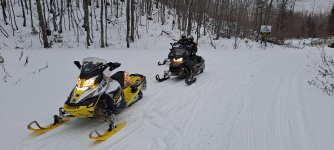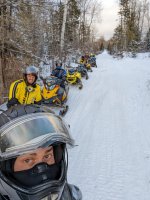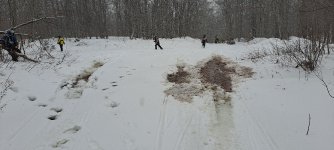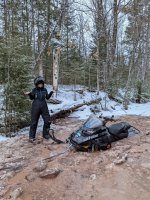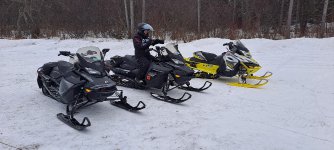I frequent this site as a xc skier and Duluth-ian (JohnDee.com snow forecasts best forecasts), and sometimes drop in here to see the chatter.
Times have fundamentally changed for land ownership, maintenance of trail systems, and funding. I have close friends throughout the mountain bike community (from corporate level to regional leadership of trails), as well as an inside look into the fundraising/land ownership of the Superior Hiking Trail.
I have little to no understanding of how snowmobile grooming is organized or works, but it appears to be disparate groups with limited sections only a handful of people manage.
The keystone is organization of a coordinated regional non-profit entity. This is an absolute requirement for getting easements and working with cities. Cities are often willing to allow things to occur provided they have an entity to pin responsibility for maintenance and management of the land use*. It can't be "my retired 65 year old friend Al"--you need a corporate face with clear leadership and responsibility (a charter, even if volunteer only). This group also creates and manages dedicated fundraising efforts from corporate sponsors, city/state money, legacy grants, and individuals. It is the means by which people and company charitable contributions become tax write offs. A vital early fundraising effort is sustaining yearly membership of trail users. The primary objective is to generate enough fundraising to create a paid staff position, whose first focus in on additional fundraising.
Due to the changing climate and resort/vacation type access in the Keweenaw, this group should also likely include summer access for UTV/side-by-side/dirt bike as part of it's charter and objectives.
Polaris, Bombardier, Can-am--they can't sell vehicles unless people have a place to ride them.
The mountain bike industry understands this and the big corporate entities actively dump money into local trail expansion and maintenance non-profits.
COGGS, the mountain bike group of Duluth, who has been around for over two decades and exclusively used it's fundraising to pay for trail expansion and winter grooming equipment, this year was able finally bring on a single paid staff person. The Superior Hiking Trail has a handful of paid staff who fundraise and coordinate trail maintenance.
The hardest part about above is finding the right person for leadership of the group at the start. A clear vision, strong business acumen, and endless free time are required (lol).
While I have zero interest in snowmobiling, I really feel for everyone here. A loss of trails for one is a loss of trails for all.
EDIT:
I hit on fundraising several times, but I want to be clear what that money pays for: first, someone to be the active voice and leader of the importance of snowmobiling in the region. A volunteer cannot sustain this effort indefinitely. Second, coordinate dollars into areas of need--whether it be new grooming equipment, updated signage, maps, trail building, trail clearing, or as simple as feeding volunteers. Sustained yearly funds allow a group to plan for the future, not just the most immediate need. This inflection point is vital to sustain and expand access.
*This is really important (SHT deals with this regularly)--if a private land owner who has granted easement has issues with idiots, they need someone to call and complain. The "Great Keweenaw Trail Consortium" can be that ear and add signage and address the issues directly with the landowner. The city/county uses GKTC for this purpose too. You become the proverbial grease to keep the tracks moving.
